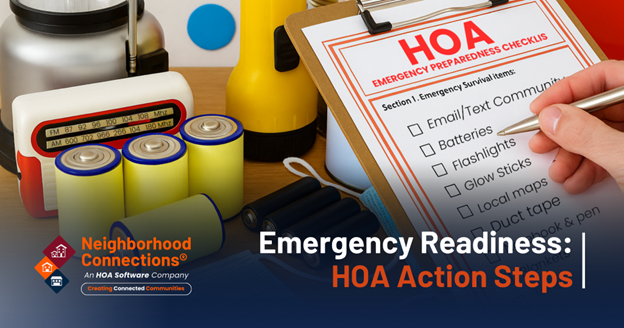
Serving on an HOA Board comes with many responsibilities—from safeguarding the association’s financial health to looking out for the well-being of residents. While day-to-day operations can be demanding, one priority should never be overlooked: having an emergency plan in place before disaster strikes.
Here are five key steps HOA Boards can take to prepare their communities for the unexpected—plus how Neighborhood Connections Software can make those steps faster, easier, and more effective.
1. Provide a 24-Hour Emergency Response Line
When a fire, leak, flood, or other emergency happens, homeowners need a quick way to reach the HOA Board or management company—after contacting emergency services if necessary.
A 24-hour emergency response line ensures that residents can connect with someone who can immediately start coordinating damage control, safety measures, or other assistance.
💡 With Neighborhood Connections: You can post emergency contact numbers directly in the resident portal, ensuring every homeowner knows exactly how to reach help—day or night.
2. Keep Contact Information Current
In an emergency, time is everything. Make sure your HOA has an up-to-date contact list for every homeowner, including phone numbers and email addresses. Organizing this list by residence rather than name allows for faster action—helping you quickly identify which homes need to be contacted.
💡 With Neighborhood Connections: All resident contact information is stored securely in one place, accessible anytime from your computer or phone. Updates happen in real-time, so you’re never stuck with outdated info when it matters most.
3. Map and Share Evacuation Routes
If disaster strikes, a clear evacuation plan can save lives. Work with your board to identify the best exit routes for each building, post them in common areas, and provide copies to all residents. For new homeowners, include evacuation information in their welcome materials so everyone stays informed from day one.
💡 With Neighborhood Connections: Upload evacuation maps, safety guides, and building-specific instructions to your community portal so residents can access them instantly—even from their mobile devices during an emergency.
4. Budget for Disasters
Some HOAs may be required—or choose—to offer financial assistance to residents in the event of a disaster. Clarify these responsibilities in advance and ensure your HOA maintains all necessary insurance coverage. Planning ahead can reduce confusion, stress, and financial strain during a crisis.
💡 With Neighborhood Connections: Track budgets, reserve funds, and insurance documentation in one central location—making it easy to find and review financial resources when quick decisions are needed.
5. Plan for the Unthinkable
From severe weather to power outages, even rare events should be considered. Just because a certain type of disaster isn’t common in your area doesn’t mean it can’t happen. Spend time discussing the “if’s, what’s, and how’s” of potential emergencies with your board. Being proactive can make all the difference.
💡 With Neighborhood Connections: Use the platform’s announcement and messaging tools to share preparedness tips, updates, and action plans with the entire community in just a few clicks—keeping everyone informed before, during, and after an event.
Final Thought:
Emergencies can happen without warning—but preparation can protect your community, minimize damage, and save lives. A well-thought-out emergency plan isn’t just a best practice—it’s a responsibility every HOA Board should prioritize.
With Neighborhood Connections software, you can centralize communication, streamline emergency procedures, and give your residents peace of mind knowing their HOA is ready for the unexpected.
Ready to learn more? Let’s connect: neighborhoodconnections.io

